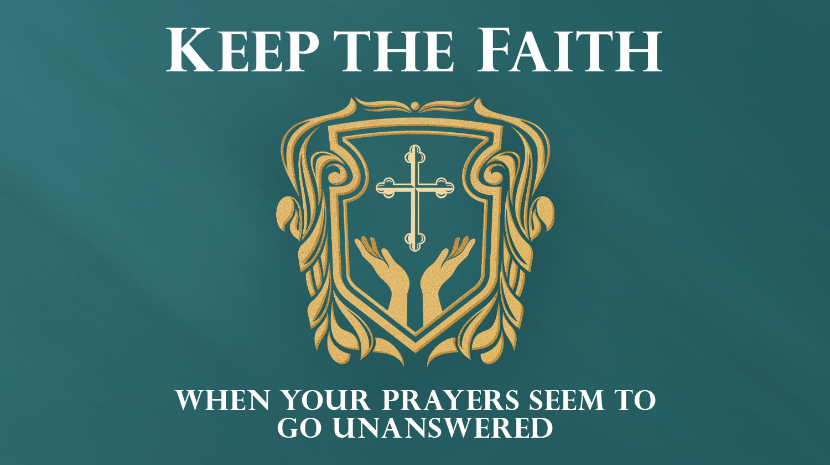From the June 2024 Issue

Keep the Faith... When Your Prayers Seem to Go Unanswered
Years ago, a church in Dallas, Texas, performed a dramatic skit just before the pastor began his sermon on prayer. The scene was set in heaven—a call center where prayer requests were received from Christians in America. Saint Peter was in charge of answering a bank of telephones, recording the prayer requests, and forwarding them on to the throne room of heaven for a response.
During the night, Peter was able to manage the incoming calls and prayer requests without much trouble. But as the day dawned and Christians began having their quiet times, the phones began ringing with ever-increasing frequency. Peter began to panic, putting people on hold while he tried to write down each request. He grew especially exasperated when conflicting requests came in: Two people in the same city were praying for opposite things—one for rain for crops and another for no rain for a family reunion. Christians supporting two football teams playing each other both sent in prayer requests that their team would win.
We are called to pray and trust that the answers we receive are the answers we need.
The congregation roared with laughter at the skit. First, it was performed with comedic skill; but second, it made them realize something we don’t often think about: the mystery of prayer. From a human perspective, prayer seems impossible! How does God receive billions of prayer requests from Christians around the world every day and “keep track” of all of them? Obviously, we are not called to understand how God answers our prayers. But we are called to pray and trust that the answers we receive are the answers we need.
And make no mistake: Americans do pray. The editor-in-chief of the Barna Group wrote in 2017 that “prayer is by far the most common spiritual practice among Americans…. The vast majority of Americans—no matter their religious affiliation or non-affiliation—participate in some kind of prayer activity.... The numbers have barely changed from year to year.... People pray mostly alone—it is a solitary activity defined primarily by the immediate needs and concerns of the individual. Corporate prayer and corporate needs are less compelling drivers in people’s prayer lives.... The good news: People have active and personal prayer lives.”1
Let’s talk about how Faith Keepers need to think about prayer. But first, a reminder: I have said in an earlier article that faith involves “being sure of what we hope for and certain of what we do not see” (Hebrews 11:1, NIV1984). When we pray, we bring our hopes to God, and we cannot at that moment “see” the answers. So from the very beginning, prayer is an exercise of faith in God. Surveys of people who pray find that many people pray who have no defined religious belief. That is, they send their prayers into the universe with the desire that they will be answered. But that is not how Christians pray. We pray to a living, personal God—a Heavenly Father—who encourages us to bring our requests to Him (Philippians 4:6-7; Hebrews 4:16). Therefore, when we pray in faith, we are sure and certain that our prayers are ascending to the throne of God and will be answered by Him.
Now—let’s consider three ways we keep the faith when it comes to prayer.
Praying Faithfully
When we pray in faith, we are sure and certain that our prayers are ascending to the throne of God and will be answered by Him.
Philippians 4:6 says to pray about “everything,” letting our “requests be made known to God.” And 1 Thessalonians 5:17 says to “pray without ceasing,” meaning to create a conversational approach to our relationship with God—praying about anything and everything at any time. Jesus even laid out a model prayer for His disciples to use when they prayed, what we refer to as the Lord’s Prayer (Matthew 6:9-13). And the Old Testament contains examples of prayers of every sort: confession, petition, questioning, praise, and more. There is no doubt that the people of God are to be people of prayer.
But one statement Jesus made about prayer, if wrongly interpreted, can be a temptation to lose our faithfulness in prayer: “Therefore do not be like [the pagans who babble on and on in prayer]. For your Father knows the things you have need of before you ask Him” (Matthew 6:8). Wait—if God already knows my needs before I pray, why do I need to pray at all?
Prayer is not just about getting things from God; it is about deepening our relationship with Him.
Part of keeping the faith is being faithful to pray, which makes us more sure and certain of God’s goodness toward us.
Waiting Faithfully
When a child comes to a parent with a request and the answer is an immediate “Yes,” the child goes away happy. But if the parent says, “Let me think about it,” the child shifts into waiting mode. That’s when tension and anxiety can set in. What will Mom’s answer be? How long will it take her to decide?
Waiting on an answer to prayer can be the second biggest test of our faithfulness. (“No” being the biggest test.) As long as we are waiting, there is still the possibility of “Yes,” so we must be resolved to trust God while we wait. And good things can happen while we wait: “But those who wait on the Lord shall renew their strength; they shall mount up with wings like eagles, they shall run and not be weary, they shall walk and not faint” (Isaiah 40:31). Instead of waiting in weakness, watching our faith become less sure and certain, we can gain strength by renewing our faith in God’s goodness and love toward us.
Paul wrote, “Be anxious for nothing” (Philippians 4:6)—and that includes being anxious about not knowing how God is going to answer our prayers. Instead of decreasing in faith, the peace of God will guard our heart and mind (verse 7).
Receiving Faithfully
As I stated, the biggest test of our faithfulness comes when God says “No” to our prayers. Even the apostle Paul was told “No” by God on two occasions.
On his second missionary journey, he and his coworkers tried to enter the region of Bithynia, “but the Spirit did not permit them” (Acts 16:7). We assume Paul was constantly praying for guidance, and in this case the answer was “No” to Bithynia. So they journeyed to Troas where Paul received a vision indicating they should go into Macedonia, which they did (verses 8-10). So, “No” to Bithynia, “Yes” to Macedonia.
When Paul prayed—three times!—for relief from his “thorn in the flesh,” the answer was “No.” Instead, he received grace to live with whatever the problem was (2 Corinthians 12:7-10). And Paul was more than happy to receive an answer he had not expected.
Did Jesus receive a “Yes” to His prayer that God would spare Him from the agony of the cross? No, just the opposite. But as a Faith Keeper, Jesus’ answer was, “Nevertheless not My will, but Yours, be done” (Luke 22:42).
If we are going to be Faith Keepers like Paul and Jesus Christ, we must be ready for God’s answer: “Yes,” “No,” or “Wait” before we pray. Only then can we prove our faith is sure and certain.
Sources:
1“Silent and Solo: How Americans Pray,” Barna, August 15, 2017.
More Articles
This Month's Magazine Resource
Subscribe Now
Each month, read articles and devotionals from Dr. David Jeremiah that will encourage, challenge, and strengthen your walk with the Lord.















 Turning Point for God is a tax-exempt, not-for-profit, religious corporation as defined under Section 501(c)(3) of the Internal Revenue Code. Your donation gift(s) are very much appreciated and may qualify as a charitable deduction for federal income tax purposes.
Turning Point for God is a tax-exempt, not-for-profit, religious corporation as defined under Section 501(c)(3) of the Internal Revenue Code. Your donation gift(s) are very much appreciated and may qualify as a charitable deduction for federal income tax purposes.




